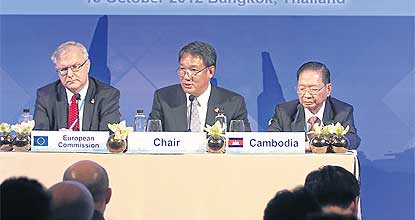
Asian and European finance ministers pledged to take steps to increase trade and investment between the two regions, while expressing cautious optimism that the worst of the euro-zone debt crisis has passed.

Speaking at the meeting yesterday are: (from left) Olli Rehn, an EU commissioner, Kittiratt Na-Ranong, the Thai finance minister, and Keat Chhon, Cambodia’s deputy prime minister and the minister of economy and finance. THITI WANNAMONTHA
Kittiratt Na-Ranong, the chairman of the 10th Asia-Europe Finance Ministers' Meeting, said avoiding non-tariff barriers would help the regions reach that goal.
"With the ongoing economic difficulties of some countries in the euro zone, I believe that our cooperation is even more crucial than ever," Mr Kittiratt said in his opening remarks.
"Because Asia and Europe are closely knitted in terms of international trade and investment, one spark of crisis could cause turmoil in the other side of the world."
Ministers representing 46 of the 49 member states of the Asia-Europe group reaffirmed their commitment to "open multilateral trading systems, non-discriminatory liberalisation and open regionalism", and also committed to "resisting protectionism in all forms, including new export restrictions and WTO-inconsistent measures".
EU commissioner Olli Rehn said the world economy is at "a critical juncture", and echoed the need for Europe and Asia to strengthen their trade and investment ties.
"It is important that we don't give in to any form of further protectionism and combat it in any guise. And the best way to do so is to complete the WTO's Doha round and trade negotiations," he said.
Mr Rehn added that the EU's intent was to avoid trade barriers and build greater trade ties with bilateral agreements with Asean countries, including Thailand.
"We have been working on a bilateral trade agreement in Thailand and several Asian countries."
The World Trade Organisation has warned that the use of non-tariff barriers has increased as countries, particularly advanced economies, take steps to protect their domestic manufacturers from the global economic slowdown. The WTO currently projects world trade growth at 2.5% this year, compared with an earlier forecast of 3.7%.
Mr Kittiratt said Asian countries should take advantage of their strong economic fundamentals to increase investment and trade with Europe, Mr Kittiratt said, noting that during the 1997 Asian economic crisis, Europe offered support for Asian economies, both in terms of investment and exports.
"Now Europe is facing an economic crisis, while Asian economies boast strong current account and trade surpluses," he said.
"It's an opportunity for Asia to help invest and import goods, helping the European economy and creating jobs."
Ministers in the final statement also agreed to support public-private partnerships in infrastructure projects, and seek ways to eliminate existing barriers to two-way investment and trade.
The European debt crisis was a major theme at the meeting, dubbed "Strengthening Dynamic Partnership, Sharing Dynamic Growth."
In the final statement, ministers said they expect the European economy to "gradually recover", and supported the implementation by Europe of "growth-friendly fiscal consolidation as well as growth-enhancing policies and structural reform".
Mr Kittiratt said the conclusions of the meeting would be forwarded to member leaders at the ASEM Summit in Vientiane next month.
Keat Chhon, Cambodia's deputy prime minister and the minister of economy and finance, said the Chiang Mai Initiative mechanism would play a key role as a financial crisis-prevention mechanism for Asia.
Formed in 2000, it gives Asean members plus Korea, Japan and China access to a $240 billion foreign reserve pool to manage short-term liquidity problems.